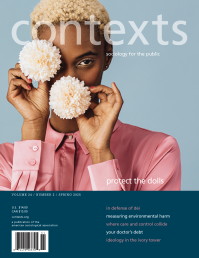
Meet the Section Editors: Laura Beth Nielsen
Now that you’ve met the co-editors of Contexts, Seth Abrutyn and Amin Ghaziani, it’s time to get to know the section editors—those amazing folks who make sure that we have a steady pipeline of fascinating work to share as culture reviews, photo essays, trends analyses, book reviews, and, of course, policy briefs. Today, we start with the brilliant Laura Beth Nielsen, fresh from her term as president of the Law & Society Association.
 Hi, Laura Beth! We’re thrilled to have you on our team as the Policy Briefs Editor and are excited to introduce you to our readers. Let’s start with the basics: who are you, where are you, and what do you do?
Hi, Laura Beth! We’re thrilled to have you on our team as the Policy Briefs Editor and are excited to introduce you to our readers. Let’s start with the basics: who are you, where are you, and what do you do?
I am Laura Beth Nielsen, professor and chair of sociology at Northwestern University and a Research Professor at the American Bar Foundation in Chicago. I am a JD/PhD (UC Berkeley ‘96/’99), and my PhD is in Jurisprudence and Social Policy—a small interdisciplinary program in which I primarily studied with sociologists. I study the relationship between law and inequality with a focus on hierarchies of unearned privilege.
Personally, what do you love about Contexts? What is its unique contribution to the discipline?
I really enjoy the experience of reading Contexts. I love the feel and look of it. It is beautiful. (Why don’t academics think about aesthetics more?) The format makes it easy to read (at a high level of generality) about areas in sociology that I do not typically read. Our discipline is so capacious, and Contexts makes me feel like I know at least the broad contours of many more specialty areas.
Tell us more about the Policy Briefs section. What’s it all about? What does it add to the magazine?
Policy Briefs has always been one of my favorite sections of Contexts. This is where sociology gets real. What are we learning from our research that policy makers, politicians, and sociologists as citizens and voters need to know?
My law school training (inherently normative and very often based on assumptions rather than empirical evidence), together with my persistent (some might say “overly optimistic”) belief in the good of most people, make public sociology and policy briefs a natural interest for me. We sociologists have something to offer, and I am always looking for ways to facilitate the kind of translation necessary for our academic world to become legible to more people.
As a discipline and as individual scholars, we often struggle to find the right balance between engaged scholarship, pure scholarship, teaching, and service. I argue we all have a moral obligation to conduct engaged scholarship. We work at institutions that take federal and state tax dollars; we accept grants funded by the government and other non-profit organizations. Through their taxes, the public supports what we do (albeit not as much as it once did!). Our careers, our research, and our scholarship all come at the expense of other public goods. Many of us ask ordinary people to be part of our research, taking their time and energy so we can learn new things about people.Given all we take and all we have, sociologists owe our social worlds something more than academic articles trapped behind paywalls. Whether it is opinion articles, serving as expert for a mainstream news outlet, drafting white papers for policy makers, or writing a Contexts policy brief, we should be giving back in ways that foster healthier communities. Policy briefs are made to be shared—with that ridiculous uncle, with our undergraduates, in city council meetings, and at the dinner table with our families. In helping us all become more informed about the social world we inhabit, they have the power to shape voting behavior, encourage civic participation, and spur needed interventions in the institutions where we spend our lives.

Comments